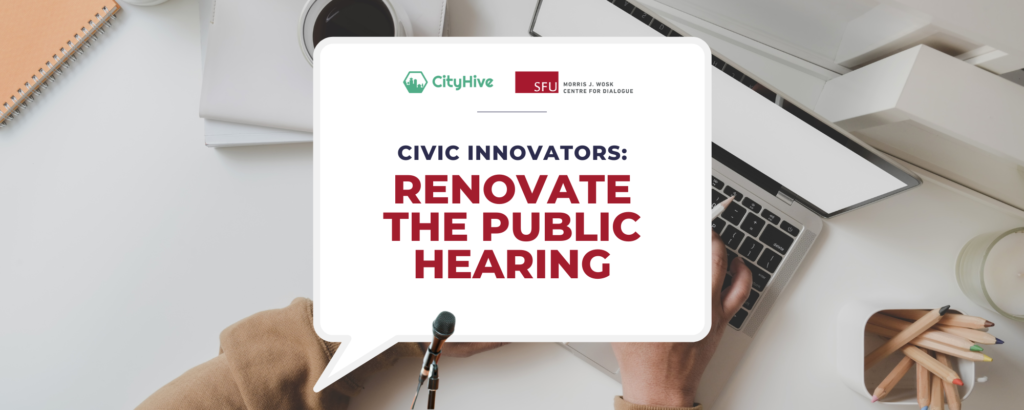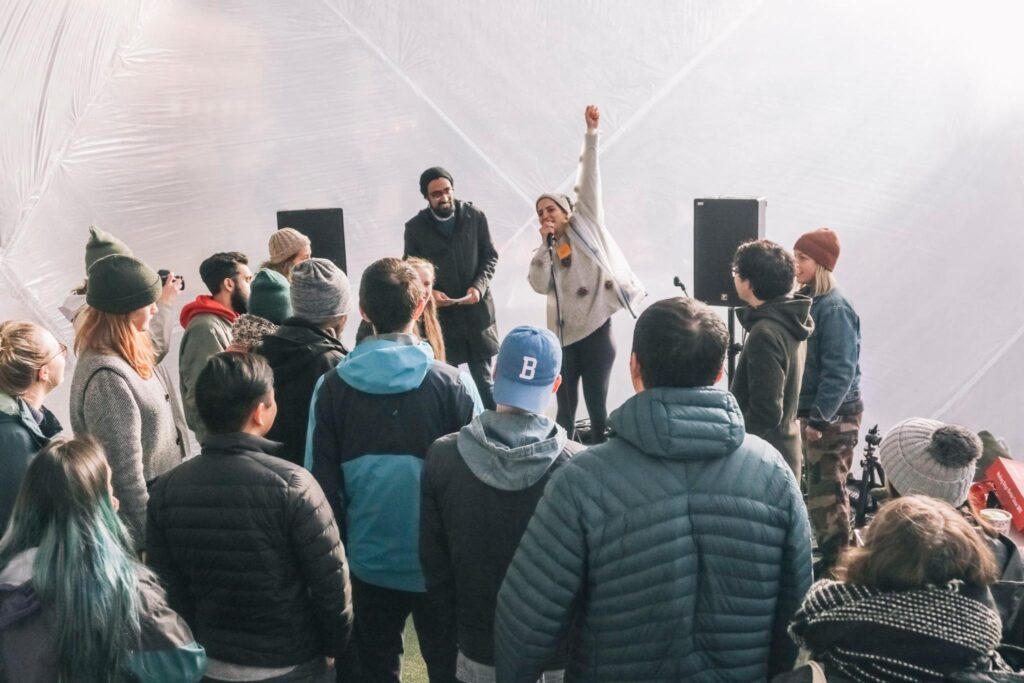
Do you ever wonder who decides what gets built, where, and why it’s the size it is? Do you ever wonder why some neighbourhoods are all single-family homes while others are highrises, shops, and duplexes? Did you know you get to be part of that conversation? Public Hearings are undergoing a renovation and we want you to be part of shaping that process!
During the Spring of 2023, CityHive held the first-ever Urban/Rural cohort to inform policy on making the Public Hearing process more accessible to constituents across the province. In this 3 month-long cohort program, participants learned how cities work, what a public hearing is, and explored different forms of governance. Participants connected with municipal staff, community members, and grassroots organizations across BC’s rural and urban centres. At the end of the program, participants created a presentation to pilot a renovation to the public hearing process.

Civic Innovators: Renovating the Public Hearing was a program for youth aged 18-30 who live anywhere in the province of BC to learn about how municipalities work and explore different ways of governance.
This program encouraged collaboration across urban and rural divides to create new policy proposals to help shape the future of our democracy. At the end of the program, participants designed their very own revamped public hearing process!
Through this program, participants:
- Learn: Participants gained knowledge of how local governments operate, including jurisdiction, decision-making, and levers for change; they developed an understanding of how the public hearing currently operates and investigated different ways of working to heighten community engagement from various stakeholders. Participants learned about the public hearing process from a wide range of community members, like municipal staff, community and grassroots organizations, and other youth.
- Investigate and Ideate: Youth worked collaboratively in teams from both urban and rural centres to investigate the public hearing process, and develop an alternative model. They got to practice key skills like project management, conducting community outreach, and creating asset maps. They also practiced giving and receiving feedback from each other and community members. Through community building, this program brought youth together to create connections across educational, professional and/or cultural silos through creative and experiential project development and learning together.
- Apply and Take Action: With a focus on experimentation and exploration, this program seeks to create opportunities for youth in the program to trial new systems and affect real change in their municipalities, and potentially across the province of B.C.
Working in teams, participants worked on projects with support from facilitators and community organizations. Our goal was for the youth participating in this program to become a part of a diverse group of youth who are excited about their municipalities and the potential for systems change in the province of B.C.
SESSION DATES
Introductions & Program Kick-off:
- Week 1: Thursday, April 13, 2023 – Icebreakers + introduction + layout of the program
Information and Engage Module:
- Week 2: Thursday, April 20, 2023 – Municipalities 101 + overview of foundational work done by BCLI + SFU, history of public hearings
- Week 3: Thursday, April 27, 2023 – Mock Public Hearing, Communication, and Engagement 101
- Week 4: Thursday, May 4, 2023 – Indigenous knowledge systems + Justice in Engagement
Action Module:
- Week 5: Thursday, May 11, 2023 – Peer Knowledge Shareback + Group Formation
- Week 6: Thursday, May 18, 2023 – Project Management + ASC map, Role Play Stakeholders/User Mapping
- Week 7: Thursday, May 25, 2023 – Office Hours – no formal session
- Week 8: Thursday, June 1, 2023 – Feedback Session
- Week 9: Thursday, June 8, 2023 – Refinement + Presentation Skills
- Week 10: Thursday, June 15, 2023 – Presentation dry run + feedback from cohort
Community Presentation & Final Celebration:
- Week 11: Thursday, June 22, 2023 – Presentations to partners, stakeholders, and community members
Frequently Asked Questions
When does the program start and how long is it?
The program starts on April 13, 2023, and will run weekly until June 22, 2023.
hide
How long does the program run each week?
Each week we will meet for 2 hours between 6:30 p.m. – 8:30 p.m
In addition to program time, you should anticipate spending 2-3 on homework in week 1-4, and 2-4 hours in weeks 5-11.
hide
How do I apply?
You can apply using the link at the top of this page. You will have the opportunity to complete a written application using the link above. Don’t hesitate to contact us if you have any issues with a written application; we will assist you.
Applications are open until Sunday, March 26 at 11:59.
hide
How much does it cost to join?
Our programs are free to you! There is ZERO cost to join Civic Innovators: Renovate the Public Hearing. We do offer additional honorariums and financial support. Please contact us for more information.
hide
I haven’t been a part of a program like this before – is that okay?
Civic Innovators: Renovate the Public Hearing is meant to be an entry point into learning about public hearings. In fact, we encourage youth who have never been a part of this type of program to apply! We work with a great team of facilitators and knowledge holders to ensure content is accessible and inclusive to all participants – regardless of the level of knowledge coming into this program.
hide
I don’t live in Vancouver, is that okay?
Yes! This program is province-wide, so as long as you live in the province of B.C. you can apply!
hide
Who will I meet?
We bring together a diverse group of 25-30 youths with various backgrounds. You will meet other youth participants who are just as eager as you to make their voices heard in policy formation. You will also meet local government officials, decision-makers, thought leaders, and subject matter experts and have chances to meet community members, past program participants, and our amazing team of facilitators.
hide
What do we do during the program sessions?
GREAT question! Our program sessions are pretty jam-packed. Our sessions are hands-on and interactive – and encourage active participation. We like to say that you’ll get out what you put in. We make sure to utilise body breaks throughout the sessions.
We blend content delivery and workshops with dialogue, group discussions, breakout sessions, and peer-to-peer learning. You can expect that we will deliver a presentation and invite you into conversation with your peers as we learn together.
hide
What’s the goal of this program?
This program is designed to do 3 things: (1) build youth’s knowledge, skills, and capacity to experiment and explore the public hearing and governance process (2) create tangible pathways for youth to shape their municipality so that it reflects their wants and desires and (3) enhance relationships between youth, their civic institutions, and organisations across the province.
hide
What’s the program like - how much time will I spend working on these projects?
The program is designed for you to get what you put into it. This is a project-based program where you are expected to work collaboratively with your peers to present a new way of revamping the public hearing process. This will require community engagement, outreach, and some investigative research to understand the advantages and problems of public hearings. In weeks 1-4, you can expect to spend 2-3 hours each week on activities outside of session time. As we move into modules 2 and 3 of the program, you can expect to spend between 2-4 hours each week, in addition to program session time, working with your group.
hide
THANKS TO OUR PARTNERS
This program was being offered as a collaboration between CityHive and the SFU Morris J Wosk Centre for Dialogue’s Renovate the Public Hearing initiative. We would like to acknowledge the financial and institutional support of SFU’s Center for Dialogue Renovate the Public Hearing Initiative.

